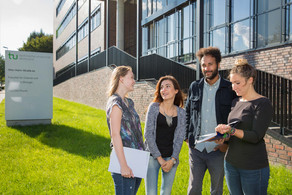Graduiertenkolleg 1855 "Discrete Optimization of Technical Systems under Uncertainty".
The optimization of technical systems is the central topic of the Research Training Group. Real optimization problems in this context are often characterized by the fact that possible values of the decision variables are chosen from a discrete set, there is a certain uncertainty with respect to various internal and external factors, and the solutions determined by algorithms have to be implemented by human operators and also have to be answered for. This results in requirements for practically usable solutions that go beyond the algorithmic solution of optimization problems with deterministic objective functions and take into account the inherent uncertainty as well as humans as part of the decision process.
The Research Training Group combines methodological sciences with applied sciences and cognitive psychology in order to arrive at practically usable solutions based on sound theory. The subject matter is strongly interdisciplinary and includes three concrete application areas from the engineering sciences. The methodology of discrete optimization under uncertainty - including the implementation of optimization methods in algorithms - is the central aspect of the research training group, which is complemented by the interaction with the human operator of an engineering system. Discrete optimization under uncertainty is a current research topic with immense application potential. The methodological and algorithmic problems involved are very challenging; their solution is of great scientific interest and offers a long-term perspective. Internationally, many groups are working on individual aspects of the topic - but the cross-sectional topic chosen in the Research Training Group represents a unique selling point.




